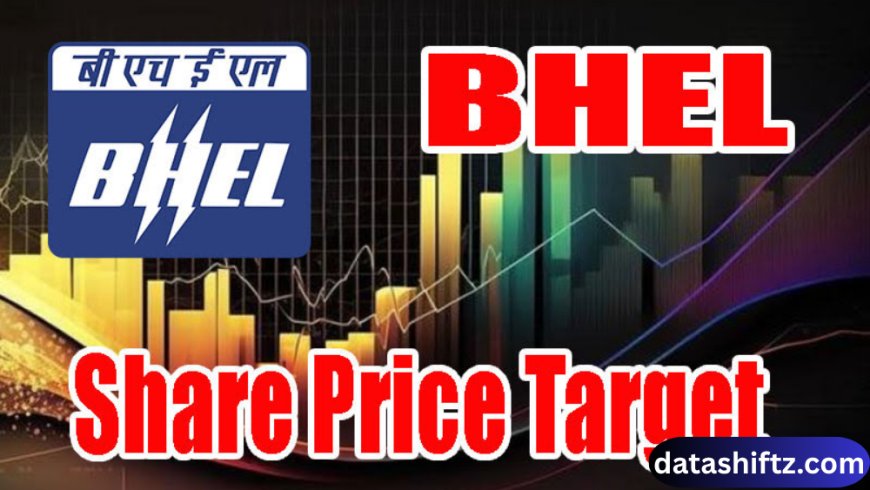BHEL Share Price: A Comprehensive Analysis

Introduction
Bharat Heavy Electricals Limited (BHEL) is a prominent public sector enterprise in India, specializing in the design, engineering, manufacturing, and servicing of a wide range of products and services for the core sectors of the economy, including power, transmission, industry, transportation, renewable energy, oil & gas, and defence. Established in 1964 and headquartered in New Delhi, BHEL is majority-owned by the Government of India and plays a pivotal role in the nation's industrial landscape. This article delves into the recent performance of BHEL's share price, examining key factors influencing its valuation and providing insights for potential investors.
Recent Share Price Performance
Current Stock Price
As of October 3, 2025, BHEL's stock is trading at ₹244.40 on the Bombay Stock Exchange (BSE), reflecting a 1.77% increase from the previous day's closing price of ₹240.15. The stock's 52-week high stands at ₹285.50, while the 52-week low is ₹176.00, indicating a potential upside of approximately 17% from the current price level. The market capitalization of BHEL is approximately ₹85,318 crore, underscoring its significant presence in the Indian capital goods sector.
Trading Volume and Market Activity
On October 3, 2025, BHEL witnessed a trading volume of over 6.2 million shares, indicating robust investor interest. The stock's price movement has been characterized by moderate volatility, with recent fluctuations reflecting broader market trends and sector-specific developments. Investors should monitor these dynamics to assess the stock's short-term prospects.
Key Financial Metrics
| Metric | Value |
|---|---|
| Market Capitalization | ₹85,318 Crore |
| P/E Ratio | 289.30 |
| EPS (TTM) | ₹0.85 |
| Dividend Yield | 0.21% |
| Debt-to-Equity Ratio | 0.00 |
| ROCE | 3.75% |
These metrics suggest that BHEL's stock is trading at a high P/E ratio, which may indicate investor expectations of future growth. The company's low debt-to-equity ratio reflects a conservative capital structure, while the return on capital employed (ROCE) indicates moderate efficiency in utilizing capital.
Factors Influencing Share Price
1. Government Initiatives and Policy Support
BHEL's performance is closely tied to government policies and initiatives, particularly in the power and infrastructure sectors. Recent announcements of increased investments in renewable energy and infrastructure development have positively impacted investor sentiment towards BHEL. The company's involvement in various government projects positions it to benefit from such policy support.
2. Technological Advancements and Strategic Partnerships
BHEL has been proactive in adopting new technologies and forming strategic partnerships to enhance its product offerings. For instance, the company signed a 10-year memorandum of understanding (MoU) with Singapore-based Horizon Fuel Cell Technologies to develop hydrogen fuel cell-based rolling stock for India's domestic railway market. Such collaborations not only diversify BHEL's portfolio but also align it with global trends towards sustainable energy solutions.
3. Financial Performance and Profitability
BHEL's financial performance plays a crucial role in determining its stock price. In the fourth quarter of FY2025, the company reported a 4% year-on-year increase in standalone net profit, amounting to ₹504.05 crore, along with a 9% growth in revenue. These figures highlight the company's ability to maintain profitability amid challenging market conditions.
4. Market Sentiment and Investor Perception
Investor sentiment significantly influences BHEL's share price. Factors such as macroeconomic conditions, sectoral performance, and global economic trends can impact investor confidence. Positive developments, such as new project acquisitions or favorable policy announcements, can lead to upward movements in the stock price, while adverse news may have the opposite effect.
Investment Considerations
Valuation Analysis
BHEL's current P/E ratio of 289.30 suggests that the stock is trading at a premium compared to the industry average. Investors should assess whether this valuation is justified based on the company's growth prospects, profitability, and risk factors. A high P/E ratio may indicate high expectations, but it also implies that the stock could be susceptible to price corrections if the company fails to meet these expectations.
Risk Factors
Potential risks associated with investing in BHEL include:
-
Regulatory Changes: Alterations in government policies or regulations can impact BHEL's operations and profitability.
-
Execution Risks: Delays or cost overruns in project execution can affect the company's financial performance.
-
Market Volatility: Fluctuations in commodity prices, particularly steel and coal, can influence BHEL's cost structure.
-
Competition: Intensifying competition from domestic and international players may pressure BHEL's market share and margins.
Long-Term Outlook
Despite short-term challenges, BHEL's strong order book, strategic initiatives, and alignment with government priorities position it for long-term growth. Investors with a long-term investment horizon may find BHEL's stock appealing, provided they are comfortable with the associated risks.
Conclusion
BHEL's share price reflects a combination of factors, including government policies, technological advancements, financial performance, and market sentiment. While the stock is trading at a high valuation, its strong fundamentals and strategic initiatives suggest potential for future growth. Investors should conduct thorough research and consider their risk tolerance before making investment decisions.






























